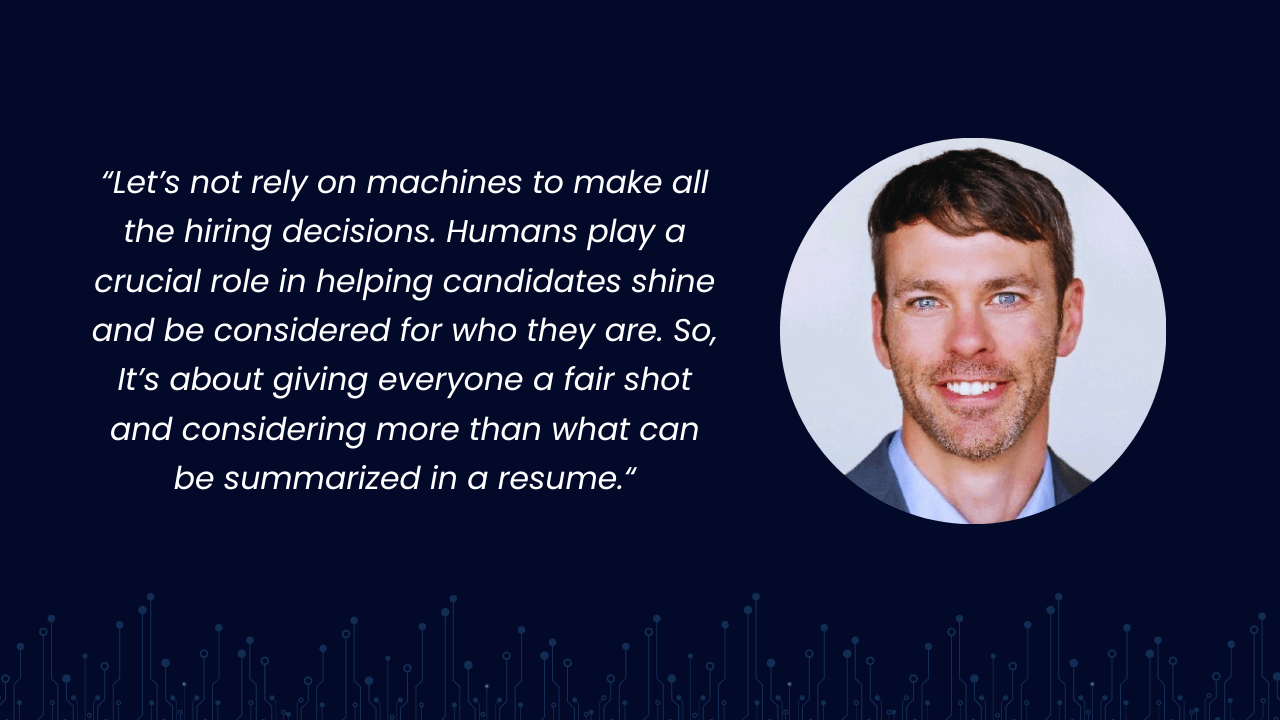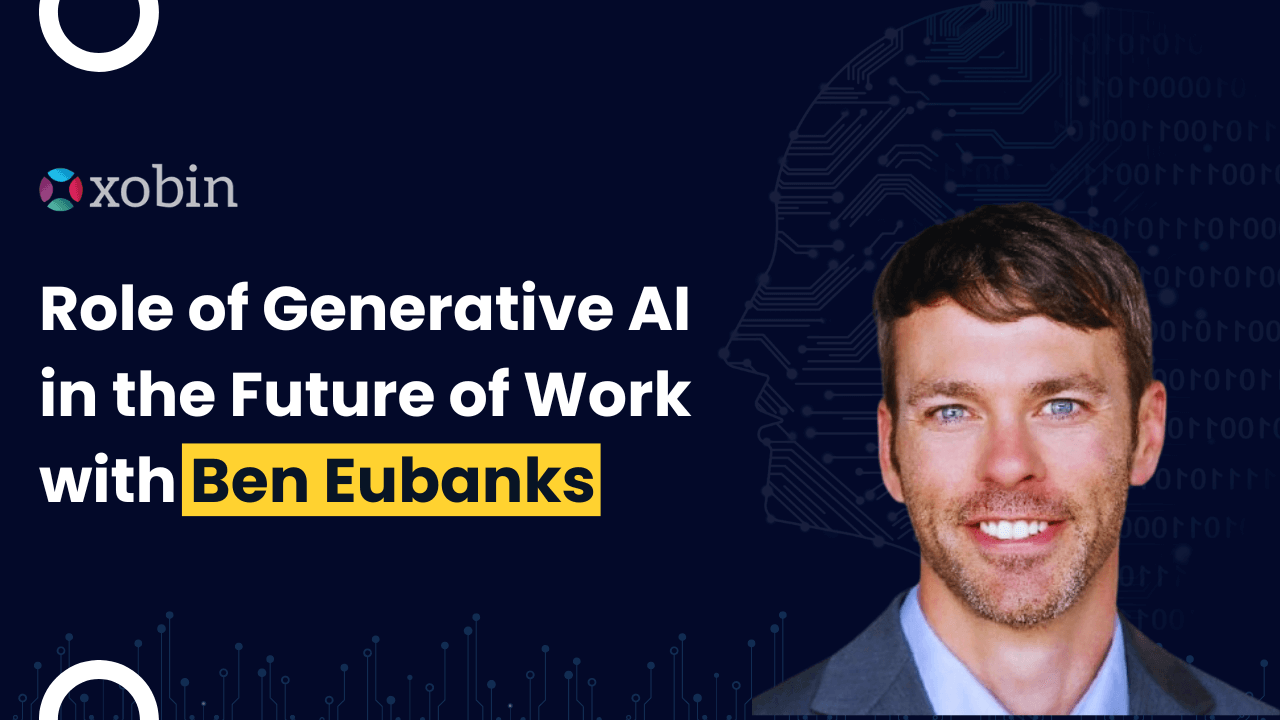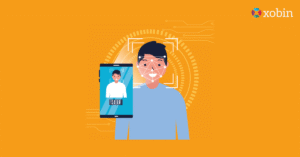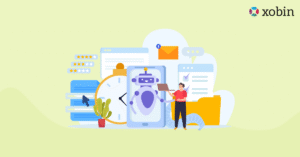In the ever-evolving landscape of work, the advent of Generative AI applications marks a paradigm shift, propelling organizations into the realm of unprecedented possibilities. These innovative tools, driven by artificial intelligence, are not merely shaping but revolutionizing the future of work. As we delve into the profound implications of Generative AI with Ben Eubanks, it becomes evident that this technological marvel is not just a tool—it’s transforming processes like AI-driven recruitment assessments, making hiring smarter and more efficient.
Table of Contents
Nowadays, AI tools are a catalyst for a new era in recruitment. As well as in tools of productivity, creativity, and efficiency in the workplace and many more. So, to understand this Xobin’s Founder and CEO, Guruprakash Sivabalan (Guru), hosted the finest researcher and expert HR Tech domain, Ben Eubanks on our Xobin Talks – A HR podcast
About Ben Eubanks
Analyst and researcher Ben Eubanks is a prominent figure in HR and talent acquisition. He is renowned for his deep insights and expertise in the field. With his vast experience, Ben has made significant contributions to the HR industry through advisory, custom research, and market insights.
As the author of 3 books and founder of an HR tech awards podcast as well as host to one of the engaging HR podcasts, Ben has been at the forefront of driving innovative HR solutions and strategies. His extensive knowledge spans areas such as talent management, employee engagement, and HR technology, and everything under the sun with AI in recruitment.
Navigating the Impact of Generative AI Applications
As we all might have read about it everywhere on the web the advent of Generative AI applications is nothing short of revolutionary. These sophisticated tools transcend conventional boundaries, reshaping the landscape of work and HR practices. From crafting compelling job descriptions to streamlining candidate sourcing, these applications are becoming indispensable assets for HR professionals.
In our Xobin Talks, we try to unfold the mysteries and the impact of Generative AI applications on HR functions. Also, exploring how these applications augment efficiency, enhance decision-making, and redefine the future of work.
So, gear up yourself as I will take you all through this insightful talk on Generative AI Applications Role in the Future of Work.
Why did you choose human capital management? As in what motivated you year after year this profession as your area of expertise?
Ben: Unlike others who join the HR field because it’s assigned to them my journey into HR wasn’t like that. I wanted to be in HR when I was a kid, I didn’t know what it was called yet, but I wanted to be in the human resources profession because I had worked with my parents who had a small business, some other companies in my, my high school years. So all the problems I had with hiring the right people and retaining them, handling their pay and benefits I enjoyed that as a kid and as a teenager.
As I entered college, an assignment to write a paper on human resources, initially perceived as mundane, turned into an epiphany. I realized that this is what i wanted to do. Once I got in it after graduation, I immersed myself in the research side of this. For example, looking at the trends, and staying on top of the technologies and tools employers are using. Because as we see in the space, all the conversation around AI is an indicator of this to be successful as an HR function.
So, unlike a decade or two ago, when HR could function with minimal technology, today’s landscape deems it essential. My excitement stems from contributing to the evolution of HR, empowering leaders to navigate this tech-infused realm effectively. Each day, I wake up enthusiastic about aiding HR leaders in leveraging data and research for informed decision-making, ensuring they serve and support their candidates and workforce seamlessly.
“Today Generative AI is a key part of being able to serve and support your candidates as well as to serve and support your workforce.”
And so that’s what excites me every day to get up and help her leaders do that in a better way, using the data, using the research to make a good decision, whatever that next decision might be.
As AI and its impact a decade back to a certain extent, there was a hesitation in buying Generative AI applications or HR tools. So, today with generative AI applications in motion I want to understand perspectives on are CHRO’s and HR’s ready to buy these products.
Ben: So, a couple of things on this one. There are lots of companies right now that are using AI tools for everything. Within the hiring process, sourcing, tracking, and screening are trying to figure out the best candidate using these Applicant Tracking System tools. But we’re also seeing some really interesting use of AI tools in the employment process like how do we use these tools to create a safe environment so people can do their best work and not have fear of injury or something else?
We’re seeing training, coaching all these areas, we’re seeing that now lots of companies are adopting this or using this, but some are more hesitant. There are, there are some concerns around some of this, especially when it comes to some of the legal requirements globally. So, setting all that aside for one second, I’ll tell you one of the things we found in our research this year on talent acquisition. One thing stood out upon asking them how they’re using AI in the hiring process and what sort of value they’re getting. They said, “We simply cannot and we will not use this.” Upon this, I asked for reasons they are as follows
Reason Behind Hesitance in using Generative AI applications:
- We don’t want to replace the humans.
- We don’t want to hurt our employer brand.
- We don’t think AI is ready to handle some of the commons of basic recruiting tasks.
And for the 2nd and 3rd answers are interesting as AI cant handle common tasks. It’s the same worry as we have with a junior recruiter in the team. Like they may say the wrong thing, they may post the wrong thing online and mess it up. But AI will always be there. Like I’m training you out to be a junior recruiter on my team. We assume that AI has gotta be perfect out of the box as it is a learning system, it’s gonna pick up things, and it’s gonna learn from signals.
Coming back, as I started, there are a lot of companies already that have adopted this, and is using it as their competitive advantage. And we expect to see that gap start to widen as those companies that are using it outpace.
Do you believe that there is a difference in decision-making when it comes to the use of Generative AI tools between different generations who may not have used this technology before? What do you believe are the key points that we should highlight to leaders when considering the use of Generative AI tools? And how can we ensure that these points are carefully considered?
Ben: Imagine you’re applying for a job, and instead of a human, an AI system sorts through your qualifications and gives you a job offer without anyone talking to you. Sounds efficient, right? Well, not really. People, especially those in fields like engineering or accounting, don’t like this. They want a chance to show more about themselves than what’s on their resume. So, the I suggests the best place for humans in the hiring process is helping candidates put their best foot forward. It’s not about just saying yes or no based on a resume; it’s about giving people a fair chance.
Therefore I emphasizes that the traditional way of looking at resumes won’t cut it. Instead, they propose a shift in how we screen candidates. It’s not just about resumes anymore; it’s about candidates doing some job-related tests. This way, they can understand what the company values, what’s important in the job, and showcase who they are beyond what a resume can tell. The goal is to let candidates demonstrate their abilities and be judged on that, not just how well they can craft a resume.

How do you perceive the dual role of Generative AI in both streamlining HR processes such as the capacity to swiftly create assessments based on resumes. On the other hand, posing a potential threat to HR tech companies by enabling rapid business creation?
Ben: Absolutely, let’s break it down. Imagine you’re hiring for a job, and now we have this cool ability to analyze resumes by screening not just to understand them but also to figure out how well they fit a particular role. It’s like having a tool that can quickly tell you if a resume matches the job you’re hiring for. This is crucial because, with the rise of technology, companies are under pressure to keep up, but there’s a catch. Moving too fast, like running with scissors, can be risky. There’s a cautionary tale about a tool that was made a few years ago but can now be replicated in minutes using advanced technology. This is where experience and a proven track record, like what Xobin offers, become vital.
Here Ben is essentially saying, “Sure, we’re all excited about how fast things are moving, but we can’t forget the risks. It’s not just about being quick to adopt new tools; it’s about making the right decisions for hiring. Companies with a history of providing real value and understanding the intricacies of hiring are the ones you can trust.” It’s like, yes, we all want to run, but let’s make sure we’re not running with scissors.
The underlying message is that the hiring process isn’t just about technology; it’s about making smart decisions. Ben encourages a thoughtful approach, especially when it comes to choosing who joins your team. It’s not just a simple data transfer; it’s a high-stakes decision-making process that requires experience and careful consideration. So, as much as the speed of innovation is exciting, it’s equally important to trust companies that have a proven history in navigating these complexities.
In your exploration of the talent shortage issue, particularly in juxtaposition with the substantial number of engineering graduates in countries like India, and considering your extensive experience advising CHROs, how do you envision the role of AI in addressing or reshaping the talent scarcity challenge globally? How can we solve the talent scarcity problem with the upcoming technologies?
Ben: Lets take an example, there’s a problem of not having enough people for all the jobs available, and this is a global issue. So, to sustain a population, you need about 2.3 births per family. On the other hand, many countries, including the US, aren’t hitting that number. So, immigration has been a short-term solution, but it’s not a sustainable fix because other countries won’t keep sending away their people.
Now, considering automation is taking over some jobs, I suggest two levers to address this. First, companies can recruit more intelligently by carefully selecting new talents and expanding their talent pools. Second, they can focus on retaining high-quality employees who are already doing well and have valuable knowledge. However, a crucial point here is that there’s no one-size-fits-all solution. Every person is different, and the same goes for different populations of workers. That’s where AI comes in.
Interestingly, AI can help by analyzing various signals to predict if an employee might quit. For example, if an employee hasn’t had a one-on-one with their manager in a while or hasn’t received a pay adjustment, it could be a sign they’re thinking about leaving. With AI, companies can intervene and make changes to retain valuable employees. The idea is that AI can assist managers in being more informed and capable, ultimately benefiting both talent leaders and the workforce.
In simple terms, we have a problem of not having enough people for jobs, and AI can be a valuable tool to help us recruit smarter and keep our best employees by predicting and addressing potential issues before they become big problems.
Is it realistic to hope for a future where everyone, regardless of their country or gender, receives equal pay for the same skills and levels of expertise. With AI and equal skills around the globe should we aim for this ideal of equal pay and skill standardization globally. If so, what might be missing or challenging in making this aspiration a reality?
Ben: Wow! That’s, it’s a great question and I’m like, I don’t know if I’m qualified to answer this one. That’s a really hard one.
Consider a scenario where you have a team with similar skills and tasks—one part in the US and the other in the Philippines or Singapore, for instance. If you’re paying one team member significantly less than the other despite comparable contributions, it raises ethical concerns. I will share a personal example of having a team member in the Philippines who does administrative work but is paid similarly to an admin in the US. The motivation is to value her work, ensure loyalty, and recognize her exceptional performance.
On the other hand, there are some companies, especially in the US, have resolved the issue of pay based on location due to the shift to remote work, this hasn’t been universally applied, particularly in the context of global teams. So, the question arises: Why isn’t there a consistent approach globally considering the lessons learned from addressing regional pay disparities within countries?
I don’t have a definitive answer but I think its high time to note the importance of recognizing and rectifying these discrepancies. Especially as much effort and intent as we put into the, the the gender pay gap and things like that.
In a world where Generative AI applications are reshaping talent acquisition and putting some roles at risk. there’s a concern about retaining top talent in HR, especially those in sourcing roles. So, how can these individuals upscale and stay engaged in HR, avoiding a shift to sales or marketing? What suggestions and insights can you provide to help them navigate the evolving HR landscape, and what role do you foresee for HR professionals in the future?
Ben: So, wow, that’s a really incredible question. I actually wrote it down because I want to think more deeply on this because it’s one that no one’s ever asked me quite like that.
So coming back to it, in simple terms, the skills that are challenging for algorithms to replicate are the human skills like compassion, creativity, and critical thinking. These skills are uniquely human and are not easily programmed into algorithms. Therefore, for individuals in any profession, including HR, focusing on developing these human-centric skills is crucial. Because, they are less susceptible to automation.
For instance, sifting through a large number of resumes and deciding whom to call back could be efficiently automated by Generative AI applications. However, the personal touch of building connections, establishing relationships, and finding unique points in a resume to initiate meaningful conversations is something that distinctly sets humans apart from algorithms. Like I found ways to connect with people. And that’s the thing that we’re gonna have to do.
“If you’re trying to figure out where your value is, it’s in building a deeper connections.”
There’s an amazing book out there called Range and the author talks about unkind learning environments. Where there’s little or no feedback, the feedback loop is so long. You may not find out for months if you made the right decision or not, right?
So, you can’t, you can’t program one to work in that sort of environment when they’re training and model an algorithm and an AI system. So if you can train yourself can work on being OK with uncertainty, being able to make decisions based on this broad perspective of things, not just knowing all the variables etc. This are the skills hard to teach an algorithm and that’s gonna give you some job security in the future.
Conclusion
In conclusion, Ben’s insights shed light on the pivotal role of HR, especially in the era of Generative AI applications. He shows importance of human skills like compassion, creativity, and critical thinking, which are challenging for algorithms to replicate. Ben’s observations and conversation delves into the potential of AI in predicting employee turnover and facilitating timely interventions demonstrates the evolving landscape of HR practices. Also, into Generative AI in talent acquisition is explored, acknowledging its efficiency while cautioning against hasty decisions, emphasizing the importance of trusted providers with a proven track record.
Whereas, he also highlights the irreplaceable value of human connections and decision-making in navigating uncertainties. His insights encourage HR professionals to focus on skills that are challenging for AI, ensuring job security in the future.






